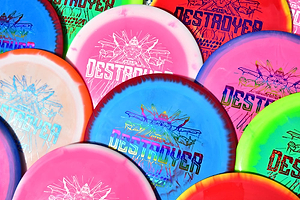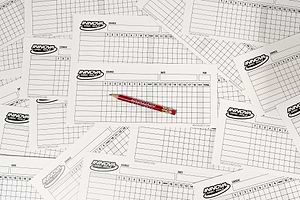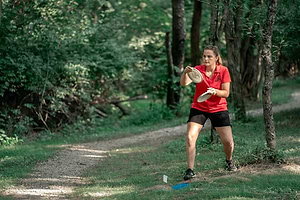Disc Golf Nutrition – You Are What You Eat!
TOC
Table of Contents
You may not realize it, but your eating habits may be holding back your disc golf game. Smarter, healthier disc golf nutrition just might be the extra advantage you need to take your disc golf game to the next level. In this article, we will explore some nutrition and dietary tips that you can apply right away. We’ll even give you some healthy, easy recipes to fix at home.
Health Benefits of Proper Disc Golf Nutrition
There are numerous health benefits when you eat better on and off the disc golf course:
- Focus—A healthier diet generally leads to a more focused mental game.
- Stamina/Endurance—A healthy heart, muscles and joints will allow you to maintain your energy levels longer. Stamina is often crucial during long disc golf tournament days.
- Longevity—One of the great things about disc golf is you can play it late into life. Staying healthy will enable you to maintain a high level of play, even as you advance in age.
- Feeling Better—Let’s face it. A healthy body and mind makes you feel good. This positive energy often translates to better play.
- Competitive Edge—All of these benefits lead to a greater disc golf experience and can give you a significant competitive edge over other disc golfers who may struggle with health issues.
Disc Golf Diet Guidelines
Why does nutrition matter in disc golf? Look at any of the top athletes in the world and they are generally in incredible shape. A proper diet is a key part of peak physical conditioning. Avoiding foods high in sugar, fat, carbs and cholesterol are usually beneficial to your overall health. Meanwhile, proteins, fibers, vitamins and nutrients can give your body the fuel it needs to succeed. Likewise, proper hydration is critical to physical health—especially when playing disc golf.
Many of us have bad nutritional habits. Fast food and junk food treats are tasty, convenient and typically less expensive than healthy foods. However, bad eating habits lead to weight gain, lethargy and other negative physical side effects that can drag you down in a competitive environment. Along with with skills training and practice, proper nutrition is another crucial step toward improvement.
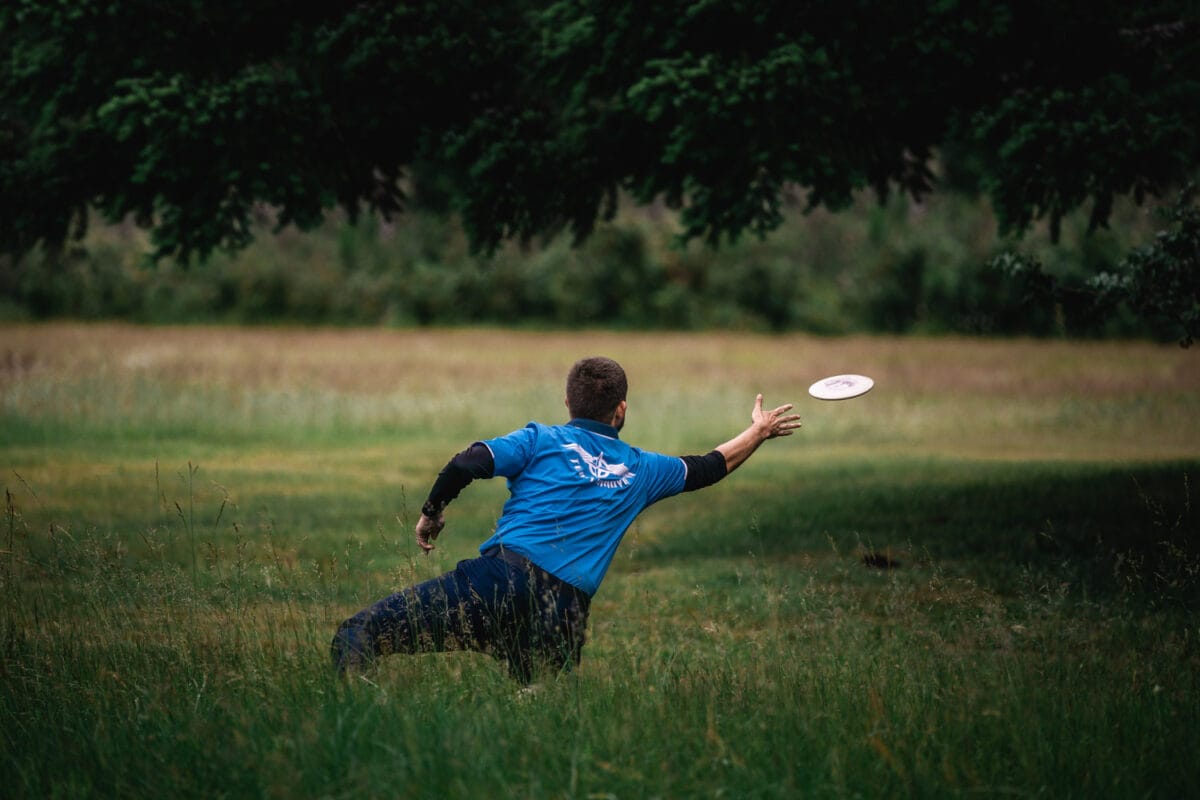
Calorie Intake
Not all calories are created equal. Simply eating fewer calories does not directly equate to a healthier lifestyle. Starving yourself can have just as much of a negative impact on your health as overeating. On the flip side, too many calories can also be bad, not only for your game, but also for your health.
You need to find the ideal calorie intake based on your height, weight and muscle mass. We all have different metabolism levels, as well. Some people naturally burn more calories than others.
Then, there are good calories and bad calories. A protein bar might be the same overall calories as a candy bar, but is formulated with more protein and nutrients. Not all protein bars are necessarily healthy, but it’s certainly a healthier choice than a Snickers bar!
Macronutrients
- Carbohydrates—Carbs are a primary source of energy, though they sometimes get a bad name in the world of healthy eating. Obviously, you don’t want to stuff yourself with carb-heavy foods all day every day. However, the right balance of carbs and other nutrients will provide you with natural energy and stamina.
- Proteins—Eating foods high in protein is essential for muscle repair and growth, which is important to staying physically fit and allowing for proper recovery after rounds.
- Fats—Again, fats have a bad name. However, there are good natural fats and really bad fatty foods high in trans fats and cholesterol. The right kind of fats can provide more sustained energy.
The ideal ratio of carbohydrates, proteins, and fats for an athlete can vary depending on the type of sport, intensity of training, and individual goals. However, a general guideline is:
- Carbohydrates: 50-60% of total daily calories
- Proteins: 15-25% of total daily calories
- Fats: 20-30% of total daily calories
Individual requirements may vary, and athletes often tailor their macronutrient ratios depending on their specific goals (e.g., muscle gain, fat loss, performance enhancement) and the periodization of their training. Consulting with a sports nutritionist is often recommended for personalized guidance.
Micronutrients
Vitamins—Vitamins play an important role in energy production and recovery, as well as fighting off illnesses and nutrient deficiencies.
Here’s a list of essential vitamins needed to sustain life, along with their recommended daily doses for the average adult:
-
- Vitamin A (700-900 mcg RAE/day)
- Vitamin C (75-90 mg/day)
- Vitamin D (600-800 IU/day)
- Vitamin E (15 mg/day)
- Vitamin K (90-120 mcg/day)
- Vitamin B1 (Thiamin) (1.1-1.2 mg/day)
- Vitamin B2 (Riboflavin) (1.1-1.3 mg/day)
- Vitamin B3 (Niacin) (14-16 mg/day)
- Vitamin B5 (Pantothenic Acid) (5 mg/day)
- Vitamin B6 (1.3-2 mg/day)
- Vitamin B7 (Biotin) (30 mcg/day)
- Vitamin B9 (Folate/Folic Acid) (400 mcg/day)
- Vitamin B12 (2.4 mcg/day)
Minerals—There are many key minerals that will benefit all athletes, including disc golfers. Here’s a list of essential minerals needed to sustain life, along with their recommended daily recommended doses for the average adult:
-
- Calcium (1,000-1,200 mg/day)
- Iron (8-18 mg/day)
- Magnesium (310-420 mg/day)
- Phosphorus (700 mg/day)
- Potassium (2,500-3,400 mg/day)
- Sodium (1,500-2,300 mg/day)
- Zinc (8-11 mg/day)
- Copper (900 mcg/day)
- Manganese (1.8-2.3 mg/day)
- Selenium (55 mcg/day)
- Iodine (150 mcg/day)
- Chromium (20-35 mcg/day)
- Molybdenum (45 mcg/day)
These doses can vary based on age, gender, and specific health conditions, so it’s important to consult with a healthcare provider for personalized recommendations.
Supplements
Vitamins and supplements can also provide positive health benefits for disc golfers. It’s best to consult with a doctor or dietitian to see what supplements might be best for your body specifically—as well as your athletic performance goals. Some people may have an iron deficiency or diabetic symptoms. Not all people will gain from the same vitamins and supplements.
Foods to Avoid for Optimal Performance
- Caffeine—Caffeine intake is a tricky one to navigate. Some disc golfers can’t function without their morning coffee or they rely on energy drinks for a little boost. Some caffeine can be okay, but too much is not good for your body. You may also have an energy crash later, which could be in a crucial point during your disc golf round.
- Sugar—Sugary foods, soft drinks, energy drinks and sports drinks again may give you a brief boost of energy. They just aren’t good for you if you consume too much. Be very careful about how much sugar and bad carbohydrates you put in your body.
- Fatty Foods—There are many fatty foods that can tempt you. You don’t have to deny yourself your favorites, but you just have to eat in moderation. It’s best to avoid heavy and fatty foods before or during a disc golf tournament to aid with peak performance on the course.
- Alcohol—It’s refreshing to enjoy a cold beer, especially during a casual round of disc golf. Alcoholic drinks can actually dehydrate you and are usually heavy in carbohydrates. Getting buzzed or completely drunk may also have other negative effects on your game.
- Eating Too Much—You want to find the right balance of calories, nutrition and energy when playing disc golf. Eating too much (or too little, for that matter) can really hinder your physical performance.
If you are looking for optimal performance for a disc golf tournament, it’s smart to practice healthy eating habits before, during and after your round.
Pre-Round Nutrition
Good carbohydrates and fats will provide you with sustained energy. Just be careful not to overeat and weigh yourself down. Foods rich in proteins, vitamins and minerals will also contribute to better physical performance.
When you eat before your round is also important. Eating too close to teeing off can make you feel weighed down. If you eat too early, any energy gains may wear off by the time you hit the course. Eating 1-2 hours before you play is usually good timing for your main pre-round meal.
Fuel During Your Disc Golf Round
It’s important to pay attention to your body as you play your disc golf round. You may find yourself feeling lethargic at certain points. This is when a healthy snack can give you the perfect pick-me-up when you need to crush a drive or make a clutch putt. Fruits, veggies, jerky, nuts and energy bars may provide a nice boost without filling you up too much.
Disc Golf Hydration Best Practices
We haven’t talked about hydration yet, but it is perhaps the most important factor to consider. Most disc golfers underhydrate before, during and after their rounds. This is not a good plan if you want to play your best. Drink lots of water the night before and the morning of your tournament. Keep a water bottle in your disc golf bag and hydrate regularly throughout your round. Don’t forget to keep hydrating after the round, as well, as that will help with your physical recovery.
Water is always the best drink for hydration, but electrolytes can have significant positive benefits. Electrolyte-loaded drinks will provide extra energy and usually a bit of flavor that may feel more refreshing. Skip the overly sugary sports and energy drinks. There are healthier options out there with lower sugar levels. Keep electrolyte tabs and drink packets in your bag if you want to add something to your water when feeling a little sluggish.
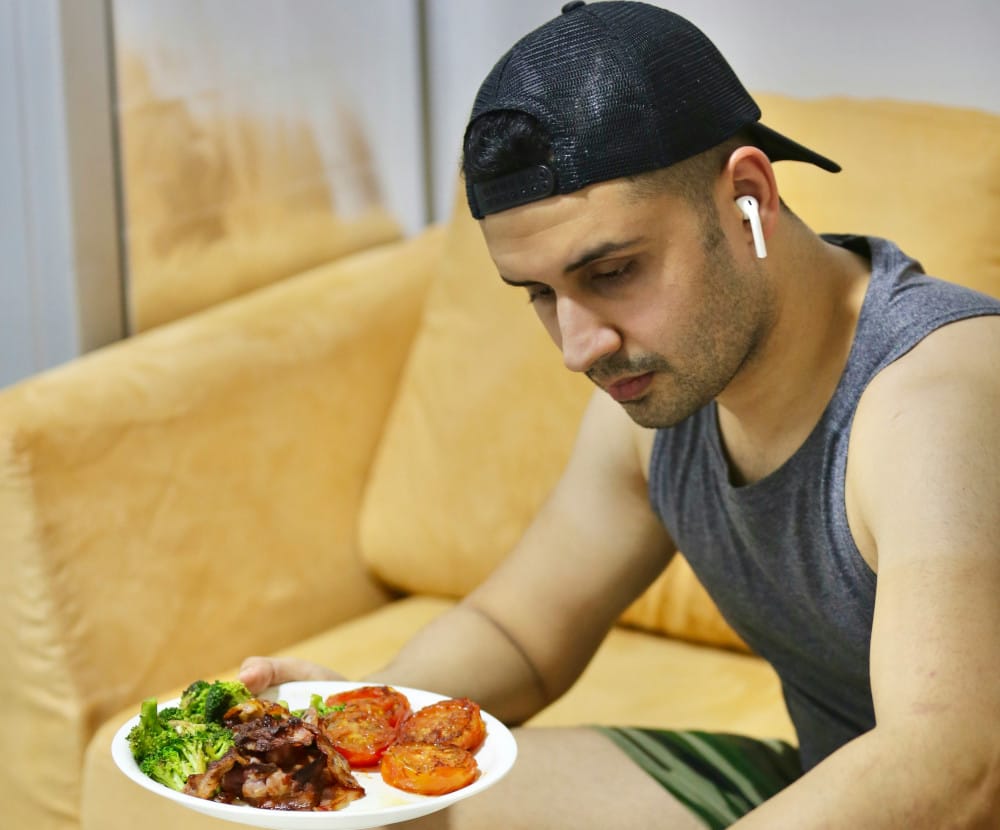
Post-Round Recovery Nutrition
Last but not least, consider what you eat after you play disc golf. It can be very tempting to pig out and have a really big, unhealthy meal. You may also want to do some drinking with your buddies in celebration. This may be fine after the full tournament is over, as long as you practice some moderation. However, this is probably not the best plan for a multi-day tournament where you still have to get up the next day (or several days) and keep playing. The choices you make tonight will directly affect how you feel next morning!
Protein-rich foods are great for post-round recovery of aching muscles. And of course, don’t forget to keep hydrating.
Combining Disc Golf and Nutrition to Lose Weight
Disc golf may not seem as intense as running or lifting weights, but don’t underestimate its ability to burn calories. Walking an 18-hole course can easily cover 2-4 miles, and when you factor in the terrain and elevation changes, you’re looking at a solid cardio workout. The sport also engages various muscle groups, from your legs (walking, climbing, and maintaining balance) to your core, shoulders, and arms (throwing the disc).
Tip: To maximize calorie burn, focus on keeping a brisk pace between holes, and consider playing on more challenging courses with hills and varied terrain.
Combining disc golf with a balanced and mindful approach to nutrition can result in losing some weight along the way. By playing regularly, focusing on nutrient-dense foods, creating a caloric deficit, and staying consistent in your efforts, you can achieve your weight loss goals while enjoying the sport you love.
Simple & Healthy Disc Golf Meal Plans
Here are two simple recipes for breakfast, lunch, and dinner with additional “add-in” options for variety and enhanced nutritional balance.
Breakfast
Option 1. Oatmeal with Berries and Almonds
- Ingredients:
- 1/2 cup rolled oats
- 1 cup water or milk (dairy or non-dairy)
- 1/2 cup mixed berries (blueberries, strawberries)
- 1 tablespoon almond butter or chopped almonds
- 1 teaspoon honey or maple syrup (optional)
- A pinch of cinnamon
- Instructions:
- Cook the oats in water or milk according to package instructions.
- Stir in the almond butter or top with chopped almonds.
- Add the mixed berries and a drizzle of honey or maple syrup if desired.
- Sprinkle with cinnamon and serve.
- Optional Add-Ins:
- 1 tablespoon chia seeds (for extra fiber and omega-3s)
- 1/4 cup Greek yogurt (for added protein)
- 1 tablespoon flaxseeds (for additional fiber and healthy fats)
- Nutritional Balance:
- Carbs: Oats and berries
- Proteins: Almonds and almond butter
- Fats: Almonds and almond butter
- Vitamins & Minerals: Berries (vitamin C, antioxidants), oats (fiber, iron)
Option 2. Egg and Veggie Scramble
- Ingredients:
- 2 large eggs
- 1/2 cup diced bell peppers
- 1/2 cup spinach leaves
- 1/4 cup diced tomatoes
- 1/4 avocado, sliced
- 1 teaspoon olive oil
- Salt and pepper to taste
- Instructions:
- Heat olive oil in a skillet over medium heat.
- Add bell peppers and sauté until softened.
- Add spinach and tomatoes, cooking until spinach is wilted.
- Crack the eggs into the skillet and scramble with the veggies.
- Serve with avocado slices on top.
- Optional Add-Ins:
- 1 tablespoon shredded cheese (for extra protein and flavor)
- 1 slice of whole-grain toast (for added carbs)
- 1 tablespoon salsa (for added flavor and vitamin C)
- Nutritional Balance:
- Carbs: Vegetables
- Proteins: Eggs
- Fats: Olive oil, avocado
- Vitamins & Minerals: Spinach (vitamin K, iron), bell peppers (vitamin C)
Lunch
Option 1. Grilled Chicken Salad with Quinoa
- Ingredients:
- 4 oz grilled chicken breast
- 1/2 cup cooked quinoa
- 2 cups mixed greens (spinach, arugula, kale)
- 1/4 cup cherry tomatoes, halved
- 1/4 cucumber, sliced
- 1/4 avocado, diced
- 2 tablespoons olive oil and lemon juice dressing
- Instructions:
- Grill the chicken breast until fully cooked and slice into strips.
- In a large bowl, combine the mixed greens, cherry tomatoes, cucumber, and avocado.
- Add the cooked quinoa and grilled chicken on top.
- Drizzle with olive oil and lemon juice dressing.
- Optional Add-Ins:
- 1 tablespoon pumpkin seeds (for added crunch and magnesium)
- 1 tablespoon feta cheese (for extra protein and calcium)
- 1 hard-boiled egg (for additional protein)
- Nutritional Balance:
- Carbs: Quinoa, vegetables
- Proteins: Chicken, quinoa
- Fats: Olive oil, avocado
- Vitamins & Minerals: Mixed greens (vitamin K, iron), tomatoes (vitamin C)
Option 2. Turkey and Avocado Wrap
- Ingredients:
- 4 oz sliced turkey breast (preferably lean)
- 1 whole-grain wrap or tortilla
- 1/4 avocado, mashed
- 1/4 cup shredded lettuce
- 1/4 cup sliced cucumber
- 1 tablespoon hummus
- Salt and pepper to taste
- Instructions:
- Spread the mashed avocado and hummus on the whole-grain wrap.
- Layer the turkey slices, lettuce, and cucumber on the wrap.
- Roll the wrap tightly and slice in half to serve.
- Optional Add-Ins:
- 1 slice of cheese (for extra protein and calcium)
- 1 tablespoon sunflower seeds (for added texture and healthy fats)
- 1 tablespoon Dijon mustard (for flavor without added calories)
- Nutritional Balance:
- Carbs: Whole-grain wrap, vegetables
- Proteins: Turkey, hummus
- Fats: Avocado, hummus
- Vitamins & Minerals: Lettuce (fiber, vitamin A), cucumber (hydration, vitamins)
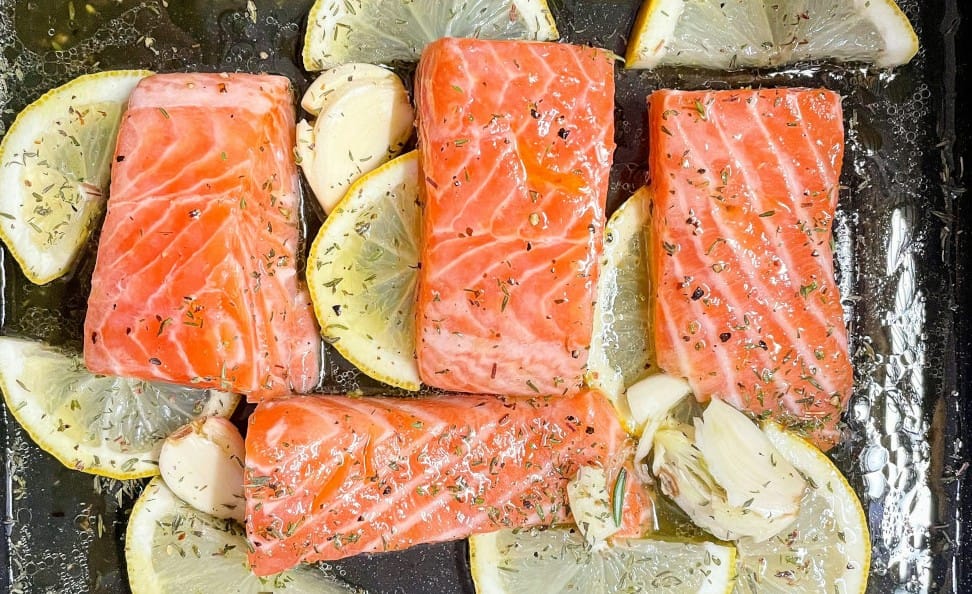
Dinner
Option 1. Baked Salmon with Sweet Potato and Steamed Broccoli
- Ingredients:
- 4 oz salmon fillet
- 1 medium sweet potato, cubed
- 1 cup broccoli florets
- 1 tablespoon olive oil
- 1 teaspoon garlic powder
- 1/2 lemon, sliced
- Salt and pepper to taste
- Instructions:
- Preheat oven to 400°F (200°C).
- Place the salmon on a baking sheet, drizzle with olive oil, and season with garlic powder, salt, and pepper.
- Place the cubed sweet potato on the baking sheet, drizzle with olive oil, and season with salt and pepper.
- Bake for 20-25 minutes until the salmon is cooked through and sweet potatoes are tender.
- Steam the broccoli while the salmon is baking.
- Serve the salmon with sweet potatoes and steamed broccoli, garnished with lemon slices.
- Optional Add-Ins:
- 1 tablespoon sesame seeds (for added flavor and healthy fats)
- 1/4 cup cooked brown rice (for extra carbs)
- 1 tablespoon soy sauce or teriyaki sauce (for added flavor)
- Nutritional Balance:
- Carbs: Sweet potato
- Proteins: Salmon
- Fats: Olive oil, salmon
- Vitamins & Minerals: Broccoli (vitamin C, fiber), sweet potato (vitamin A)
Option 2. Lean Beef Stir-Fry with Vegetables and Brown Rice
- Ingredients:
- 4 oz lean beef strips
- 1 cup mixed vegetables (bell peppers, snap peas, carrots)
- 1/2 cup cooked brown rice
- 1 tablespoon soy sauce or tamari
- 1 teaspoon sesame oil
- 1 clove garlic, minced
- 1 teaspoon ginger, minced
- Salt and pepper to taste
- Instructions:
- Heat sesame oil in a large skillet or wok over medium-high heat.
- Add the garlic and ginger, cooking until fragrant.
- Add the beef strips and cook until browned.
- Add the mixed vegetables and stir-fry until tender-crisp.
- Stir in the soy sauce or tamari and season with salt and pepper.
- Serve over cooked brown rice.
- Optional Add-Ins:
- 1 tablespoon cashews or peanuts (for added crunch and healthy fats)
- 1 tablespoon hoisin sauce (for extra flavor)
- 1 tablespoon sliced green onions (for added flavor and vitamins)
- Nutritional Balance:
- Carbs: Brown rice, vegetables
- Proteins: Lean beef
- Fats: Sesame oil
- Vitamins & Minerals: Mixed vegetables (vitamins A, C, and fiber), brown rice (fiber)
Here are some additional resources for healthier eating habits and meal ideas:
American Heart Association – Healthy Eating
The Nutrition Source – Healthy Eating Plate
Best Disc Golf Snacks
Here’s a list of the best on-the-go healthy snacks for disc golf performance that can keep your energy levels up without weighing you down:
- Fruits and Vegetables (Eat a banana prior to your round to prevent muscle cramps)
- Granola or Protein Bars (preferably those lower in sugar)
- Nuts and Nut Butter Packets (preferably those with less salt/sodium)
- Rice Cakes
- Jerky
- Greek Yogurt
- Energy Bites
- Dried Seaweed
- Whole Grain Crackers
- Legumes (Edamame, Roasted Chickpeas, Dry-Roasted Peanuts)
People Also Ask
What should I eat right before a round?
Don’t eat anything too heavy right before you tee off. Eat your breakfast well beforehand. A small snack with a little bit of carbs and protein is a good call to provide you with a nice boost of energy before you start your disc golf round.
How can I stay energized during a long round / tournament?
Above all else, it’s important to stay hydrated. Dehydration will really drag you down. Otherwise, drink plenty of water and incorporate some electrolytes to replenish your system. Pack some light and healthy snacks in your disc golf bag to provide you with an energy boost when you need it during the round.
What are the best recovery foods after playing?
You’ll want to eat foods rich in proteins, healthy fats and fiber for the best post-round recovery meal. These can help your muscles recover and keep you feeling better heading into the next day. Also, remember to keep hydrating and minimize your alcohol and sugar intake.
Personalized Disc Recommendations
Just answer a few questions and we’ll send you personalized recommendations within 24 hours.
GET PRO TIPS
